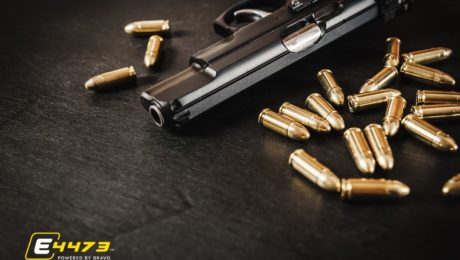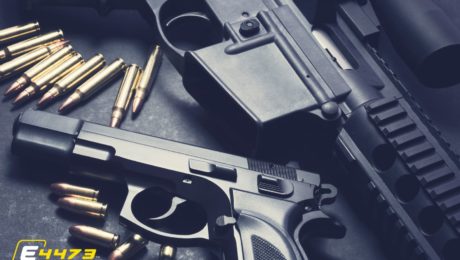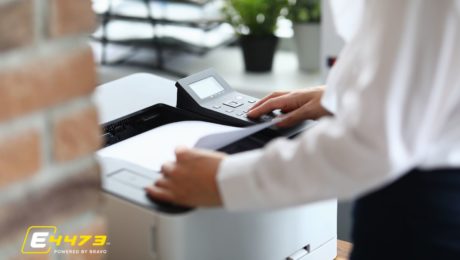Ditch the Paperwork Nightmare: Online 4473 with E4473 is Your Ultimate Solution
Saturday, February 08 2025
For Federal Firearms Licensees (FFLs) across the nation, staying compliant with ATF regulations is paramount. One of the most critical aspects of this compliance is the accurate and efficient completion of the Bureau of Alcohol, Tobacco, Firearms and Explosives (ATF) Form 4473 – Firearms Transaction Record. Traditionally, this has meant mountains of paper, potential errors, and hours spent on manual data entry. But what if there was a better way? What if you could streamline your Form 4473 process, reduce errors, and save valuable time and resources? The answer is here, and it’s called E4473 – your ultimate solution for completing the 4473 forms online. Proudly part of the Bravo Store Systems family, E4473 integrates seamlessly with the comprehensive solutions you trust. The Pain Points of the Traditional Paper 4473: Let’s be honest, dealing with paper forms can be a headache: Human Error: Illegible handwriting, missed fields, and simple data entry mistakes can lead to compliance issues and potential penalties. Time Consuming: Manually filling out each form takes time – time that your staff could be spending on serving customers and growing your business. Storage Challenges: Keeping years’ worth of paper, 4473 forms organized and accessible, can quickly become a logistical nightmare, taking up valuable storage space. Audit Concerns: During an ATF audit, sifting through stacks of paper to locate specific forms can be stressful and inefficient. Enter E4473.com: The Modern Solution for FFL Compliance E4473 revolutionizes the Form 4473 process by offering a secure, efficient, and user-friendly online platform. Here’s why it’s the ultimate solution for your FFL: Error Reduction: Intelligent form fields and built-in validation help ensure accuracy and reduce the likelihood of errors before submission. Time Savings: Customers can securely complete their portion of the form online before even stepping into your store, significantly speeding up the in-store process. Enhanced Compliance: E4473 is designed with ATF regulations in mind, helping you stay compliant and minimize the risk of violations. Improved Customer Experience: Offer your customers a convenient and modern experience, reducing wait times and streamlining the firearm purchasing process. Accessibility: Access your records securely from any device with an internet connection, providing flexibility and convenience for your business. Why Choose E4473? As a firearms dealer, you understand the importance of efficiency and compliance. E4473 offers a significant upgrade to your current Form 4473 process, allowing you to: Serve more customers efficiently: Reduce transaction times and increase throughput in your store. Minimize compliance risks: Reduce errors and simplify record keeping for smoother ATF audits. Embrace modern technology: Position your business as forward-thinking and customer-focused. Save valuable time and resources: Free up staff to focus on other critical aspects of your business. Ready to Ditch the Paper Trail? Stop struggling with outdated paper forms. Embrace the future of FFL compliance with E4473. It’s the smart, secure, and efficient way to handle your online 4473 requirements. Visit E4473.com today to learn more and request a demo. Streamline your operations and experience the ultimate solution for online 4473 processing and elevate your entire FFL operation with the power of Bravo Store Systems! Don’t let paperwork slow you down. Upgrade to Bravo Store Systems and experience the difference. Your business will thank you!
- Published in Uncategorized
No Comments
A Comprehensive Guide to FFL Gun Fees: A B2B Perspective
Friday, September 20 2024
A Comprehensive Guide to FFL Gun Fees: A B2B Perspective Understanding FFL Gun Fees: A Crucial Aspect of Firearms Business As a business operating in the firearms industry, understanding FFL (Federal Firearms License) gun fees is paramount. These fees can significantly impact your bottom line, especially if you’re dealing with high-volume transactions. In this comprehensive guide, we’ll delve into the intricacies of FFL gun fees, exploring various factors that influence them and providing practical tips to manage your costs effectively. What are FFL Gun Fees? FFL gun fees are charges imposed on licensed firearms dealers for the services they provide. These fees typically cover the administrative costs associated with processing firearm transfers, maintaining compliance with federal regulations, and ensuring the safety and security of firearms. Factors Influencing FFL Gun Fees Several factors can influence the specific FFL gun fees you’ll encounter: Type of FFL: The type of FFL you hold will determine the fees you’re subject to. For instance, a Type 01 dealer (retailer) might face different fees compared to a Type 07 (manufacturer). Federal Regulations: Changes in federal firearms regulations can impact FFL fees. For example, new compliance requirements might lead to increased administrative burdens, which could result in higher fees. State and Local Laws: In addition to federal regulations, state and local laws can also influence FFL gun fees. Some jurisdictions may impose additional fees or restrictions on firearms dealers. Volume of Transfers: The number of firearm transfers you handle will generally affect your overall fees. Dealers with higher volumes may be able to negotiate better rates or discounts. Transfer Type: The type of transfer (e.g., retail sale, private party transfer, consignment) can also influence fees. Some transfers might involve more complex paperwork or administrative procedures, leading to higher costs. FFL Provider: Different FFL providers may charge varying fees for their services. It’s essential to compare rates and services to find the most cost-effective option. Common FFL Gun Fee Components While the specific breakdown of FFL gun fees can vary, the following components are often included: Transfer Fees: Charges for processing firearm transfers, including background checks, paperwork, and administrative costs. ATF Fees: Fees imposed by the Bureau of Alcohol, Tobacco, Firearms, and Explosives (ATF) for licensing and compliance purposes. NFA Fees: Fees associated with National Firearms Act (NFA) items, such as suppressors or machine guns. Storage Fees: Charges for storing firearms on behalf of customers. Additional Services: Fees for services beyond the basic transfer process, such as shipping or insurance. Managing FFL Gun Fees: Practical Tips Negotiate Rates: If you have a high volume of transfers, consider negotiating with fellow FFLs for better rates or discounts. Review Fees Regularly: Periodically review your FFL gun fees to ensure they remain competitive and aligned with your business needs. Minimize Administrative Burdens: Streamline your operations to reduce administrative overhead and associated costs. Stay Informed about Regulations: Keep up-to-date with federal, state, and local firearms regulations to avoid penalties and unnecessary expenses. Pass Fees on to Customers: In some cases, you may be able to pass a portion of your FFL gun fees on to your customers. However, it’s important to be transparent about your pricing structure. Understanding FFL gun fees is crucial for any firearms business. By understanding the factors that influence these fees and implementing effective management strategies, you can minimize costs and maximize your profitability. By following the guidelines outlined in this guide, you can make informed decisions regarding your FFL fees and ensure your business remains competitive in the firearms industry.
- Published in Uncategorized
A Comprehensive Guide to FFL Firearm Meaning: A B2B Perspective
Wednesday, September 18 2024
A Comprehensive Guide to FFL Firearm Meaning: A B2B Perspective Understanding FFL Firearms: A Crucial Aspect of Firearms Business As a business operating in the firearms industry, understanding the concept of FFL firearms is paramount. This term, often used interchangeably with FFL-regulated firearms, encompasses a wide range of weapons subject to federal regulations. In this comprehensive guide, we’ll delve into the intricacies of FFL firearms, exploring their definitions, types, and the significance of FFL licensing in the firearms industry. What are FFL Firearms? FFL firearms are firearms that are regulated by the Bureau of Alcohol, Tobacco, Firearms, and Explosives (ATF) and require a Federal Firearms License (FFL) for their manufacture, importation, or sale. These firearms include a variety of weapons, such as: Handguns: Pistols, revolvers, and other firearms designed to be held with one hand. Rifles: Firearms designed to be fired from the shoulder, typically using longer barrels. Shotguns: Firearms designed to fire multiple projectiles, such as buckshot or birdshot. Destructive Devices: Weapons, such as grenades, machine guns, and silencers, that are capable of causing significant damage. The Significance of FFL Licensing FFL licensing is a crucial aspect of the firearms industry. It ensures that businesses dealing in firearms adhere to federal regulations, preventing the illegal trafficking of weapons and promoting public safety. By obtaining an FFL, businesses can legally engage in the manufacture, importation, and sale of firearms, subject to specific requirements and restrictions. FFL License Types There are several FFL License types available, each with its own specific requirements and limitations. These include: Type 01: Dealer in firearms other than destructive devices. Type 02: Pawnbroker in firearms other than destructive devices. Type 03: Manufacturer of firearms. Type 07: Manufacturer of ammunition. Type 08: Importer of firearms. Type 09: Dealer in destructive devices. Key Regulations for FFL Firearms FFL firearms are subject to various federal regulations, including: Gun Control Act of 1968: This act established the framework for regulating the sale and possession of firearms in the United States. National Firearms Act (NFA): The NFA imposes additional regulations on certain types of firearms, such as machine guns, suppressors, and short-barreled rifles. Anti-Drug Abuse Act of 1988: This act imposed stricter regulations on the sale and possession of firearms, particularly those associated with drug trafficking. Compliance and Recordkeeping FFL holders are required to comply with strict recordkeeping requirements. They must maintain accurate records of all firearms transactions, including sales, purchases, and transfers. Additionally, FFL holders must conduct background checks on all purchasers to ensure they are not prohibited from owning firearms. Understanding the concept of FFL firearms and FFL License types is essential for businesses operating in the firearms industry. By comprehending the different types of FFL firearms, the significance of FFL licensing, and the applicable regulations, you can ensure that your business complies with federal laws and operates ethically. This knowledge will also help you navigate the complexities of the firearms industry and make informed decisions regarding your business operations.
- Published in Uncategorized
ATF Forms in New Hampshire: A Comprehensive Guide with Bravo Store Systems
Sunday, September 08 2024
ATF Forms in New Hampshire: A Comprehensive Guide with Bravo Store Systems Understanding ATF Forms in New Hampshire ATF Forms are essential documents for anyone involved in the firearms industry or the purchase of firearms in New Hampshire. These forms serve as records of firearms transactions and help ensure compliance with federal and state firearms laws. Key ATF Forms Used in New Hampshire ATF Form 4473: The most common ATF form used for firearm purchases. It collects information about the buyer, seller, and firearm. ATF Form 1: Used by individuals who want to manufacture a firearm that is regulated by the National Firearms Act (NFA). ATF Form 2: Used by manufacturers and importers of NFA firearms to register their products. ATF Form 3: Used for tax-exempt transfers of NFA firearms between licensed dealers. ATF Form 4: Used for tax-paid transfers of NFA firearms to individuals. ATF Form 5: Used for tax-exempt transfers of NFA firearms to certain governmental entities. Rules and Regulations for ATF Forms in New Hampshire Federal Firearms License (FFL): To legally sell firearms in New Hampshire, you must hold a valid FFL. This license is issued by the ATF and requires a thorough background check, payment of a fee, and compliance with federal regulations. Recordkeeping: FFL holders in New Hampshire must maintain accurate and complete records of all firearm transactions, including ATF Forms. These records must be retained for a minimum of five years. Prohibited Persons: Certain individuals are prohibited from purchasing or possessing firearms in New Hampshire, such as felons, domestic abusers, and those with certain mental health conditions. FFL holders are responsible for verifying the eligibility of buyers using the National Instant Criminal Background Check System (NICS). Background Checks: Before transferring a firearm, FFL holders in New Hampshire must conduct a background check on the buyer using the National Instant Criminal Background Check System (NICS). This system is operated by the FBI and allows for instant checks of a buyer’s criminal history. Import and Export: The import and export of firearms is subject to strict federal regulations. FFL holders in New Hampshire must comply with these regulations when dealing with firearms that cross state or international borders. New Hampshire-Specific Regulations: In addition to federal regulations, New Hampshire has its own state firearms laws. These laws can vary depending on the type of firearm, the purpose of the transfer, and other factors. FFL holders in New Hampshire must be familiar with these state-specific regulations. Bravo Store Systems: A Comprehensive Solution for ATF Forms in New Hampshire Bravo Store Systems offers a powerful and efficient solution for managing firearms transactions and ensuring compliance with ATF Forms in New Hampshire. Our software can help FFL holders: Automate ATF Form Processing: Our software can automatically generate and process ATF Forms, reducing errors and saving time. Streamline Recordkeeping: Bravo Store Systems can help you maintain organized and easily accessible records of all firearm transactions, including ATF Forms. Conduct Background Checks: Our software integrates with NICS, making it easy to conduct background checks on buyers. Manage Inventory: Keep track of your firearm inventory, including serial numbers, make, model, caliber, and other relevant information. Generate Reports: Generate various reports to analyze sales trends, identify inventory shortages, and monitor compliance with regulations. Integrate with New Hampshire-Specific Requirements: Bravo Store Systems can be configured to comply with New Hampshire-specific firearms laws, such as reporting requirements and prohibited firearm lists. Additional Considerations for ATF Forms in New Hampshire Concealed Carry Permits: New Hampshire has laws governing the issuance and use of concealed carry permits. FFL holders in New Hampshire may need to be aware of these laws and how they affect firearm sales. Hunting and Fishing Regulations: New Hampshire has specific regulations regarding the use of firearms for hunting and fishing. FFL holders may need to be familiar with these regulations to ensure compliance. Private Transfers: In some cases, individuals in New Hampshire can transfer firearms to each other without involving an FFL holder. However, there are specific requirements and restrictions that must be followed. ATF Forms are essential for compliance with firearms regulations in New Hampshire. By understanding the rules and regulations associated with these forms and utilizing a comprehensive solution like Bravo Store Systems, you can ensure compliance with federal and state laws and protect your business.
- Published in Uncategorized
Streamlining Firearm Sales: A Guide to Gun Form 4473 for FFLs
Saturday, September 07 2024
Streamlining Firearm Sales: A Guide to Gun Form 4473 for FFLs As a Federal Firearms Licensee (FFL), ensuring smooth and compliant firearm transfers is paramount to your business. Gun Form 4473 plays a central role in this process. This guide equips your team with the knowledge to handle Gun Form 4473 efficiently, maximizing customer satisfaction and minimizing potential hiccups. But what if there was a way to revolutionize this process entirely? Meet E4473, the all-in-one solution designed to streamline Gun Form 4473 completion and transform your FFL operations. Gun Form 4473: The Cornerstone of Compliant Sales Every firearm transfer from your establishment necessitates the completion of Gun Form 4473, a federal document mandated by the Bureau of Alcohol, Tobacco, Firearms and Explosives (ATF). This form serves a multifaceted purpose: Background Checks: Gun Form 4473 initiates mandatory background checks through the National Instant Criminal Background Check System (NICS) [1]. A crucial step in verifying the customer’s eligibility to own a firearm. Customer Identification: The form captures the buyer’s personal information, including name, address, and government-issued ID details. This ensures the firearm reaches the authorized recipient. Firearm Details: Gun Form 4473 documents the specifics of the firearm being transferred, such as make, model, and serial number. This information aids in ATF record-keeping and tracking. Legal Affirmations: The form poses a series of questions the buyer must answer truthfully under penalty of law. These questions pertain to their legal eligibility to own a firearm, identifying any disqualifying factors. The FFL’s Pain Points with Gun Form 4473 Let’s face it, the traditional Gun Form 4473 process can be cumbersome for both you and your customers. Here are some common pain points FFLs experience: Time-Consuming Completion: Paper forms lead to errors and require manual data entry, extending transaction times. Inaccurate Information: Handwritten forms are prone to mistakes, potentially delaying transfers or causing compliance issues. Inefficient Customer Experience: Customers may find the paper-based process confusing or frustrating, impacting satisfaction. Manual Recordkeeping: Maintaining physical copies of Gun Form 4473s is cumbersome and requires dedicated storage space. Introducing E4473: The Solution to Your Gun Form 4473 Woes E4473 streamlines the entire Gun Form 4473 process, transforming it from a paper-based hassle into a digital breeze. Here’s how E4473 empowers your FFL business: Digital Forms & Workflows: E4473 eliminates paper forms. Customers can complete Gun Form 4473 securely and conveniently on their smartphones, tablets, or in-store kiosks. Automated Error Detection: Built-in logic identifies potential errors in real-time, preventing delays and ensuring accuracy. Seamless NICS Integration: E4473 seamlessly integrates with the NICS background check system, expediting the process. Beyond Efficiency: The Customer Experience Advantage E4473 doesn’t just benefit your internal operations; it also elevates the customer experience. Here’s how: Faster Transactions: Streamlined digital forms lead to quicker completion times, getting customers out the door faster. Improved Accuracy: Automated error detection minimizes mistakes and ensures a smooth buying process. User-Friendly Interface: E4473 boasts a user-friendly interface, guiding customers effortlessly through the form. Investing in Efficiency: The E4473 Advantage E4473 is more than just software; it’s an investment in the future of your FFL business. By streamlining Gun Form 4473 completion, you can: Reduce Costs: Minimize wasted time and resources associated with paper forms. Increase Efficiency: Boost transaction speed and free up staff time for other tasks. Enhance Customer Satisfaction: Provide a faster, more user-friendly buying experience. Ensure Compliance: Maintain accurate and secure records effortlessly. Gun Form 4473 is a crucial part of every FFL firearm transfer, but the traditional paper process can be cumbersome. This guide explores the importance of Gun Form 4473 and the challenges FFLs face. It then introduces E4473 as a solution, revolutionizing Gun Form 4473 completion with a digital platform that reduces errors, streamlines workflows, and enhances customer experience, ultimately saving FFLs time, money, and headaches. Overall, E4473 helps your FFL business operate smoother, save money, and provide a more positive customer experience.
- Published in Uncategorized
A Comprehensive Guide to ATF Forms in Idaho: Ensuring Compliance with Bravo Store Systems
Friday, September 06 2024
A Comprehensive Guide to ATF Forms in Idaho: Ensuring Compliance with Bravo Store Systems Understanding ATF Forms in Idaho ATF Forms are essential documents for anyone involved in the firearms industry or the purchase of firearms in Idaho. These forms serve as records of firearms transactions and help ensure compliance with federal and state firearms laws. Key ATF Forms Used in Idaho ATF Form 4473: The most common ATF form used for firearm purchases. It collects information about the buyer, seller, and firearm. ATF Form 1: Used by individuals who want to manufacture a firearm that is regulated by the National Firearms Act (NFA). ATF Form 2: Used by manufacturers and importers of NFA firearms to register their products. ATF Form 3: Used for tax-exempt transfers of NFA firearms between licensed dealers. ATF Form 4: Used for tax-paid transfers of NFA firearms to individuals. ATF Form 5: Used for tax-exempt transfers of NFA firearms to certain governmental entities. Rules and Regulations for ATF Forms in Idaho Federal Firearms License (FFL): To legally sell firearms in Idaho, you must hold a valid FFL. This license is issued by the ATF and requires a thorough background check, payment of a fee, and compliance with federal regulations. Recordkeeping: FFL holders in Idaho must maintain accurate and complete records of all firearm transactions, including ATF Forms. These records must be retained for a minimum of five years. Prohibited Persons: Certain individuals are prohibited from purchasing or possessing firearms in Idaho, such as felons, domestic abusers, and those with certain mental health conditions. FFL holders are responsible for verifying the eligibility of buyers using the National Instant Criminal Background Check System (NICS). Background Checks: Before transferring a firearm, FFL holders in Idaho must conduct a background check on the buyer using the National Instant Criminal Background Check System (NICS). This system is operated by the FBI and allows for instant checks of a buyer’s criminal history. Import and Export: The import and export of firearms is subject to strict federal regulations. FFL holders in Idaho must comply with these regulations when dealing with firearms that cross state or international borders. Idaho-Specific Regulations: In addition to federal regulations, Idaho has its own state firearms laws. These laws can vary depending on the type of firearm, the purpose of the transfer, and other factors. FFL holders in Idaho must be familiar with these state-specific regulations. Bravo Store Systems: A Comprehensive Solution for ATF Forms in Idaho Bravo Store Systems offers a powerful and efficient solution for managing firearms transactions and ensuring compliance with ATF Forms in Idaho. Our software can help FFL holders: Automate ATF Form Processing: Our software can automatically generate and process ATF Forms, reducing errors and saving time. Streamline Recordkeeping: Bravo Store Systems can help you maintain organized and easily accessible records of all firearm transactions, including ATF Forms. Conduct Background Checks: Our software integrates with NICS, making it easy to conduct background checks on buyers. Manage Inventory: Keep track of your firearm inventory, including serial numbers, make, model, caliber, and other relevant information. Generate Reports: Generate various reports to analyze sales trends, identify inventory shortages, and monitor compliance with regulations. Integrate with Idaho-Specific Requirements: Bravo Store Systems can be configured to comply with Idaho-specific firearms laws, such as reporting requirements and prohibited firearm lists. Additional Considerations for ATF Forms in Idaho Concealed Carry Permits: Idaho has laws governing the issuance and use of concealed carry permits. FFL holders in Idaho may need to be aware of these laws and how they affect firearm sales. Hunting and Fishing Regulations: Idaho has specific regulations regarding the use of firearms for hunting and fishing. FFL holders may need to be familiar with these regulations to ensure compliance. Private Transfers: In some cases, individuals in Idaho can transfer firearms to each other without involving an FFL holder. However, there are specific requirements and restrictions that must be followed. Unique Idaho Laws: Idaho has some unique firearms laws, such as the ability to carry concealed weapons without a permit in certain situations. FFL holders in Idaho must be aware of these laws to ensure compliance. Conclusion ATF Forms are essential for compliance with firearms regulations in Idaho. By understanding the rules and regulations associated with these forms and utilizing a comprehensive solution like Bravo Store Systems, you can ensure compliance with federal and state laws and protect your business.
- Published in Uncategorized
ATF Form 4473: Key Changes and Implications
Thursday, September 05 2024
ATF Form 4473: Key Changes and Implications The Bureau of Alcohol, Tobacco, Firearms, and Explosives (ATF) recently revised Form 4473, the standard firearms transaction form used in the United States. These changes aim to address evolving legal requirements and enhance compliance efforts. Let’s explore the key modifications and their potential implications. New Manufacturer Category One of the most significant changes is the addition of a “Privately Made Firearm (PMF)” category. This reflects the recent rule regarding frames and receivers. Homemade firearms, if legally constructed, no longer require a serial number unless transferred to another person. Residence Question Section B, line 10, now includes a question asking if the purchaser resides within city limits. This addition is likely intended to address situations where individuals may have a city address but actually reside outside the city’s boundaries. Expanded Qualifying Questions To potentially deter straw purchasers and gun traffickers, two new qualifying questions have been added to Section B. These questions inquire about the purchaser’s intent to sell or dispose of the firearm to a prohibited person or for illegal purposes. Age Requirements and Waiting Periods The Senate gun control bill passed last summer has led to changes in age requirements and waiting periods. For individuals aged 18-20, a waiting period of up to 10 days may apply if NICS identifies a potential disqualifying juvenile record. Implementation and Implications FFLs should be using the latest revision of Form 4473. While the changes may have minimal impact for most gun owners, the waiting period for 18- to 20-year-olds could face legal challenges. It’s crucial for individuals to carefully review the form and understand the new questions to avoid potential issues. The revised ATF Form 4473 incorporates significant changes to address evolving legal requirements and enhance compliance efforts. Understanding these modifications is essential for both gun owners and FFLs to ensure a smooth and legal firearm transfer process.
- Published in Uncategorized
Can I print the Form 4473?
Friday, August 16 2024
Can I Print the Form 4473? Yes, You Can (But There Is a Catch) Federal firearms licensees (FFLs) play a crucial role in ensuring responsible firearm transfers. Part of that responsibility involves completing and maintaining accurate ATF Form 4473, the Firearms Transaction Record. While the process may seem straightforward, questions often arise regarding printability. This article clarifies the ability to print Form 4473 and explores the nuances associated with its usage within your FFL business. Printability of ATF Form 4473 The Bureau of Alcohol, Tobacco, Firearms and Explosives (ATF) offers the latest revision of Form 4473 as a downloadable PDF on their official website. This downloadable format allows FFLs to: Print the form for in-house completion by the transferee (buyer) during the transfer process. Pre-print the form with your FFL information (Section A) for faster transaction times. Important Note: Regardless of the printing method, ensure you use the current revision of the form available on the ATF website. Outdated versions are not compliant and can lead to delays or rejections during the National Instant Criminal Background Check System (NICS) check. Considerations for Printed Forms While printing Form 4473 offers flexibility, here are key aspects to remember: Legibility and Completeness: The printed form must be clear and free of smudging or ink bleeding that could hinder readability by the ATF during inspections. Ensure all sections are completed accurately and legibly by both the FFL and transferee. Security: Printed forms require additional safeguards. Store blank forms securely to prevent unauthorized access. Implement procedures to ensure completed forms are maintained according to ATF regulations, typically for a minimum of 20 years. Integration with Electronic Bound Book: While ATF is developing an electronic Form 4473 (eForm 4473), it’s not yet universally mandated. If you utilize an electronic bound book system for transaction records, ensure a compatible workflow exists for integrating data from printed forms. Alternatives to Printed Forms The ATF has its own digital version of Form 4473, and many FFL software providers have developed a digital form as well. Digital forms offer improved efficiency, reduced paperwork, and potentially faster NICS processing times. Maintaining Compliance Regardless of the chosen method (printed or electronic), FFLs are responsible for complying with ATF regulations regarding Form 4473. This includes: Using the current revision of the form. Completing all sections accurately and legibly. Maintaining completed forms for the required period (typically 20 years). The ATF website provides a wealth of resources on Form 4473, including detailed instructions, storage requirements, and compliance guidelines. We recommend familiarizing yourself with these resources to ensure your FFL business adheres to best practices. The ability to print Form 4473 offers flexibility for FFLs. However, maintaining accurate records, ensuring form security, and potentially transitioning to digital forms in the future are crucial considerations. By staying informed and adhering to ATF regulations, you can ensure smooth firearm transfers while safeguarding your business’s compliance. Note: This article is intended for informational purposes only and should not be construed as legal advice. Always consult with an attorney to ensure compliance with all applicable federal, state, and local laws.
- Published in Uncategorized
Who Fills Out the ATF Form 4473? A Guide for FFLs
Friday, August 02 2024
The ATF Form 4473, also known as the Firearms Transaction Record, the ATF 4473, or 4473 form, is a crucial document in every commercial firearm sale. As a Federal Firearms Licensee (FFL), ensuring its proper completion is essential for compliance with federal regulations. But when it comes to filling out the form, there can be some confusion. So, who exactly fills out the ATF 4473? The Buyer Takes the Lead The primary responsibility for completing the ATF Form 4473 falls on the prospective buyer. They will answer all the questions about their identity, residency, and eligibility to own a firearm. This includes details like: Full name Date of birth Address history Social Security number (optional) Information about restraining orders or felony convictions (which would disqualify them from purchase) FFL Provides Assistance (But Doesn’t Take Over) While the buyer has the primary responsibility, FFLs play a vital role in facilitating the completion of the ATF Form 4473. Here’s how you can assist your customers: Provide the Form: Keep a readily available stock of ATF Form 4473s (the latest revision) for customers. You can order them for free from the ATF Distribution Center. Offer Guidance: Be prepared to answer questions about the form and clarify any sections that might be confusing for the buyer. Verify Information: You, the FFL, are responsible for verifying the information provided by the buyer. This includes: Checking their identification (valid government-issued photo ID) Running a background check through the National Instant Criminal Background System (NICS) Key Points for FFLs to Remember Don’t Pre-fill the Form: The buyer must personally complete the ATF Form 4473. You cannot pre-fill any sections for them. Maintain Accuracy: Ensure all information is entered accurately and legibly. Complete Your Part: As the FFL, you’ll complete specific sections of the form, including your FFL information, the type of firearm being transferred, and the results of the NICS background check. Sign and Maintain Records: Both you and the buyer must sign the form. You’ll then keep the original 4473 Form as part of your permanent records. Additional Considerations for FFLs Multiple Transfers: If there are multiple buyers for a single firearm, each buyer must complete their own separate ATF Form 4473. Private Transfers: The ATF Form 4473 is not required for private firearm transfers between unlicensed individuals. However, it’s crucial to be aware of your state’s laws regarding private firearm transfers, as some states may have additional requirements. Benefits of Streamlining the ATF Form 4473 Process By ensuring a smooth and accurate ATF 4473 completion process, you can: Reduce Errors: Clear communication and guidance can minimize mistakes on the form, preventing delays and potential compliance issues. Improve Customer Experience: A streamlined process creates a positive experience for your customers, fostering trust and loyalty. Maintain Compliance: Accurate record-keeping and adherence to ATF regulations are essential for your FFL’s continued operation. The ATF 4473 is a critical component of responsible firearm sales. By understanding who fills out the form and how to facilitate its completion effectively, FFLs can ensure a smooth transaction for both themselves and their customers, all while maintaining compliance with federal regulations.
- Published in Uncategorized
A Guide for FFLs: Does the Form 4473 Have to Be Filled Out in Person?
Friday, July 19 2024
While you won’t find the ATF Form 4473 pre-filled online for security reasons, the process of acquiring a firearm still benefits from some advanced preparation. This is especially true for Federal Firearms Licensees (FFLs) who need to ensure a smooth and compliant transaction. So, let’s address a common question: does the Form 4473 have to be filled out in person? In-Person Completion is Mandatory The ATF Form 4473, also known as the Firearms Transaction Record, must be filled out in person by the prospective buyer at the FFL’s location. This is a federal regulation to ensure the identity and eligibility of the firearm purchaser. The Buyer Takes Responsibility The primary responsibility for completing the ATF Form 4473 falls on the buyer. They will answer all the questions about their identity, residency, and eligibility to own a firearm. This includes details like: Full name Date of birth Address history Social Security number (optional) Information about restraining orders or felony convictions (which would disqualify them from purchase) FFL Provides Support While the buyer has the leading role, FFLs play a vital role in facilitating the completion of the ATF Form 4473. Here’s how you can assist your customers: Provide the Form: Keep a readily available stock of ATF Form 4473s (the latest revision) for customers. You can order them for free from the ATF Distribution Center. Offer Guidance: Be prepared to answer questions about the form and clarify any sections that might be confusing for the buyer. Verify Information: You, the FFL, are responsible for verifying the information provided by the buyer. This includes: Checking their identification (valid government-issued photo ID) Running a background check through the National Instant Criminal Background System (NICS) Key Points for FFLs to Remember No Pre-Filling: The buyer must personally complete the ATF Form 4473. You cannot pre-fill any sections for them. Accuracy is Key: Ensure all information is entered accurately and legibly. Complete Your Part: As the FFL, you’ll complete specific sections of the form, including your FFL information, the type of firearm being transferred, and the results of the NICS background check. Sign and Maintain Records: Both you and the buyer must sign the form. You’ll then keep the original ATF Form 4473 as part of your permanent records. Additional Considerations for FFLs Multiple Transfers: If there are multiple buyers for a single firearm, each buyer must complete their own separate ATF Form 4473. Private Transfers: The ATF Form 4473 is not required for private firearm transfers between unlicensed individuals. However, it’s crucial to be aware of your state’s laws regarding private firearm transfers, as some states may have additional requirements. Benefits of a Streamlined Process By ensuring a smooth and accurate ATF Form 4473 completion process, you can: Reduce Errors: Clear communication and guidance can minimize mistakes on the form, preventing delays and potential compliance issues. Improve Customer Experience: A streamlined process creates a positive experience for your customers, fostering trust and loyalty. Maintain Compliance: Accurate record-keeping and adherence to ATF regulations are essential for your FFL’s continued operation. While the ATF Form 4473 must be filled out in person, advanced preparation can make the process smoother for both you and your customers. By understanding your role in facilitating its completion, you can ensure a compliant and positive experience for everyone involved. Make this process as smooth as possible for you and your customers with the help of Bravo’s Point of Sale for gun stores.
- Published in Uncategorized
- 1
- 2










